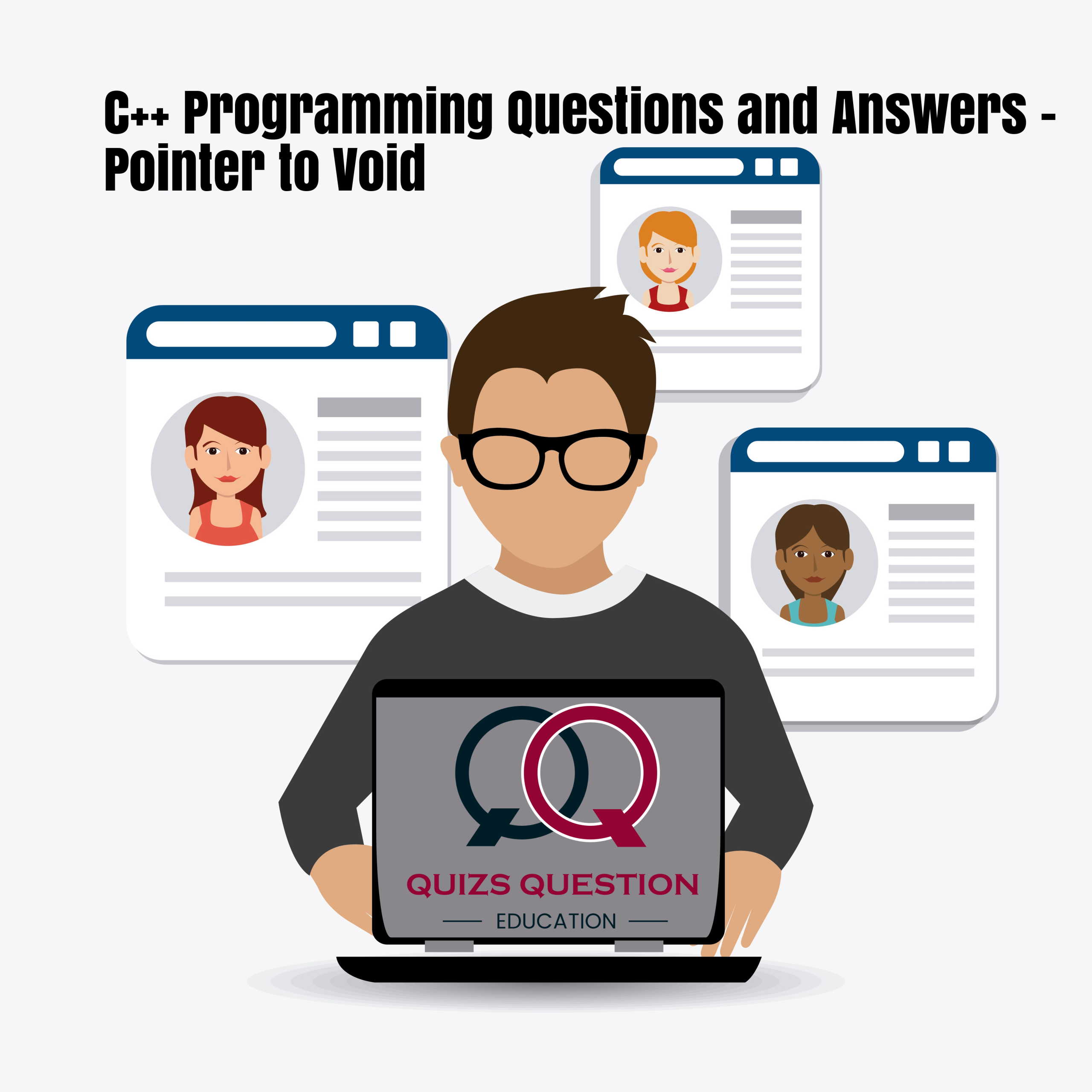Q 1. The void pointer can point to which type of objects?
A. int
B. float
C. double
D. all of the mentioned
Show Answer
Answer:-B. floatExplanation
Because it doesn’t know the type of object it is pointing to, So it can point to all objects.Q 2. When does the void pointer can be dereferenced?
A. when it doesn’t point to any value
B. when it cast to another type of object
C. using delete keyword
D. using shift keyword
Show Answer
Answer:-B. when it cast to another type of objectExplanation
By casting the pointer to another data type, it can be dereferenced from the void pointer.Q 3. The pointer can point to any variable that is not declared with which of these?
A. const
B. volatile
C. static
D. both const & volatile
Show Answer
Answer:-D. both const & volatileExplanation
Pointer can point to any variable that is not declared with const & volatile.Q 4. A void pointer cannot point to which of these?
A. methods in c++
B. class member in c++
C. methods & class member in c++
D. none of the mentioned
Show Answer
Answer:-D. none of the mentionedExplanation
A void pointer can point to methods & class member in c++.Q 5. What will be the output of the following C++ code?
#include <iostream>
using namespace std;
int func(void *Ptr);
int main()
{
char *Str = “abcdefghij”;
func(Str);
return 0;
}
int func(void *Ptr)
{
cout << Ptr;
return 0;
}
A. abcdefghij
B. address of string “abcdefghij”
C. compile time error
D. runtime error
Show Answer
Answer:-B. address of string “abcdefghij”Explanation
Even though it is a void pointer, we gets the address. Output: $ g++ b.cpp $ a.out 0x8048714Q 6. What will be the output of the following C++ code?
#include <iostream>
using namespace std;
int main()
{
int *p;
void *vp;
if (vp == p)
cout << “equal”;
return 0;
}
A. no output
B. equal
C. compile error
D. runtime error
Show Answer
Answer:-B. equalExplanation
The void pointer is easily converted to any other type of pointer, so these are equal. Output: $ g++ poi4.cpp $ a.out equalQ 7. What will be the output of the following C++ code?
#include <iostream>
using namespace std;
int main()
{
int i;
char c;
void *data;
i = 2;
c = ‘d’;
data = &i;
cout << “the data points to the integer value” << data;
data = &c;
cout << “the data now points to the character” << data;
return 0;
}
A. 2d
B. 3d
C. 4d
D. two memory addresses
Show Answer
Answer:-D. two memory addressesExplanation
Because the data points to the address value of the variables only, So it is printing the memory address of these two variable. Output: $ g++ poi2.cpp $ a.out the data points to the integer value0xbfc81824 the data now points to the character0xbfc8182fQ 8. What will be the output of the following C++ code?
#include <iostream>
using namespace std;
int main()
{
int n = 5;
void *p = &n;
int *pi = static_cast<int*>(p);
cout << *pi << endl;
return 0;
}
A. 5
B. 6
C. compile time error
D. runtime error
Show Answer
Answer:-A. 5Explanation
We just casted this from void to int, so it prints 5 Output: $ g++ poi1.cpp $ a.out 5Q 9. What will be the output of the following C++ code?
#include <iostream>
using namespace std;
int main()
{
int a = 5, c;
void *p = &a;
double b = 3.14;
p = &b;
c = a + b;
cout << c << ‘\n‘ << p;
return 0;
}
A. 8, memory address
B. 8.14
C. memory address
D. 12
Show Answer
Answer:-A. 8, memory addressExplanation
In this program, we are just adding the two values and printing it. Output: $ g++ poi.cpp $ a.out 8 0xbfef0378Q 10. What we can’t do on a void pointer?
A. pointer functions
B. pointer arithmetic
C. pointer objects
D. pointer functions & objects


Leave a Reply